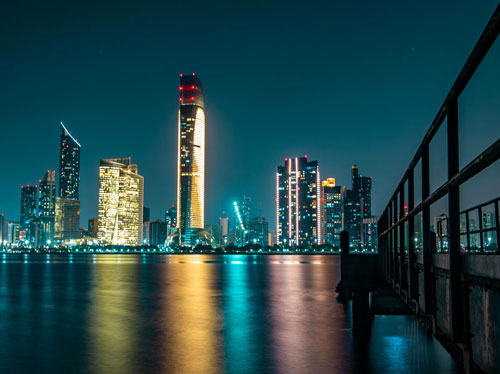Abu Dhabi first to target light spill

Abu Dhabi has become one of the first cities in the Middle East to target light spill with pro-active management as part of its environmental legislation.
Under a unique decree issued this week, interior lighting from private spaces including homes and businesses will be checked to see how far it spills outside, as this contributes to light and visual pollution. Those in breach of the policy will be granted a grace period ‘to adjust their lighting accordingly’.
Light trespass has long been an issue in the region and the policy from the Abu Dhabi Department of Municipalities and Transport is believed to be the first in the world to take pro-active steps to tackle offending home- and business-owners, rather than acting on foot of a complaint.
The Abu Dhabi Dark Sky Policy aims to preserve the night sky and ‘foster a sustainable future for communities throughout the emirate’. The new rules will be complemented by an awareness campaign dubbed Discover the Beauty of Abu Dhabi’s Sky. This is designed to educate residents and visitors about the importance of preserving the night sky.
The initiative is, says the Department, aligned with the global endeavours of the International Dark Sky Association. The policy’s approach includes the promotion of sustainable lighting systems, protecting the natural environment and wildlife, supporting scientific research in the field of astronomy, enhancing public health, and promoting sustainable development.
‘The Abu Dhabi Dark Sky Policy embodies our commitment to a future where the beauty of the night sky is cherished and protected’, His Excellency Dr Salem Al Kaabi, Director General of Operations Affairs at the Department of Municipalities and Transport, told the Press.
‘Aligned with global environmental initiatives, this policy establishes a comprehensive framework for responsible urban development, fostering awareness and adherence to sustainable lighting practices. By creating a harmonious coexistence between our urban landscape and celestial wonders, we aim to enhance residents’ quality of life and contribute to a global movement aimed at preserving natural beauty.’
Applicable to both the public and private sectors – but excluding cultural festivals and events – the policy’s guidelines will target current and new outdoor lighting equipment.
To meet the policy’s objectives, Department sources say that cooperation is required from all relevant parties to the conditions outlined in the Abu Dhabi Dark Sky Policy, alongside applicable manuals and the Estidama Pearl Building Rating System.
A methodology to address light pollution has been implemented, alongside awareness programmes aimed at educating individuals on preserving Abu Dhabi’s night sky. The regulations will be applied across public buildings, streets, parks, beaches, commercial organisations, open and undeveloped spaces, agricultural and industrial areas. They include shielded lighting, external and facade lights, as well as motion-activated security lighting, and a coordinated shutdown of non-security lighting at midnight.
• Diary date: Circular Lighting Live 2024, Recolight’s flagship conference and exhibition, takes place on Wednesday 9 October 2024 at the Royal College of Physicians in London. Free to specifiers, Circular Lighting Live 2024 will feature leading experts, specifiers and policy makers who will share their insights into forthcoming standards and legislation, emerging technologies and new business models. More info: www.circularlighting.live
Picture copyright 2020 Kevin Villaruz via Pexels


